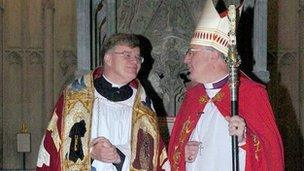CofE drops opposition to gay bishops in civil partnerships
- Published
- comments
Prebendary Rod Thomas says the first bishop in a civil partnership will cause a "furore"
The Church of England has dropped its prohibition on gay clergy in civil partnerships becoming bishops.
The announcement, from the Church's House of Bishops, would allow gay clergy to become bishops if they promise to be celibate.
Conservative evangelical Anglicans say they will fight the move in the Church's ruling general synod.
The issue has split the church since 2003 amid a row over gay cleric Jeffrey John becoming Bishop of Reading.
Mr John, now Dean of St Albans, was forced to withdraw from the role shortly after having initially accepted it, following protests from traditionalists.
He was also a candidate for Bishop of Southwark in 2010 but was rejected. Evidence emerged that this was because of his sexual orientation.
The Church of England has already agreed to allow people in civil partnerships to become clergy, provided they promised they would remain celibate.
In July last year, the House of Bishops (HoB) said it would review this decision, made in 2005, to decide whether it could also relate to bishops.
In the list of decisions at its latest meeting in December,, external it has now confirmed that those conditions could now extend to bishops.
This amounts to a lifting of the moratorium on the appointment of clergy in civil partnerships as bishops, the Church Times said., external
Fiercely resisted
The Rt Rev Graham James, Bishop of Norwich, said on behalf of the House of Bishops that it would be "unjust" to exclude anyone for consideration for the role of bishop who was "seeking to live fully in conformity with the Church's teaching on sexual ethics or other areas of personal life and discipline".
He said: "All candidates for the episcopate undergo a searching examination of personal and family circumstances, given the level of public scrutiny associated with being a bishop in the Church of England.

Mr John is now the Dean of St Albans
"But these, along with the candidate's suitability for any particular role for which he is being considered, are for those responsible for the selection process to consider in each case."
BBC religious affairs correspondent Robert Pigott said that, given the tension surrounding the issue of sexuality, the Church's decision to allow men in civil partnerships to become bishops represented a major concession and one with considerable symbolic significance.
Conservative evangelicals have warned they would be willing to bring in bishops from overseas to avoid serving under a gay bishop.
The Reverend Rod Thomas, chairman of the evangelical group Reform, said the idea of appointing people in civil partnerships as bishops had not been agreed or debated by the wider Church.
"That would be a major change in church doctrine and therefore not something that can be slipped out in the news, it is something that has got to be considered by the general synod."
He said there would be great divisions in the Church if clergy in a civil partnership were appointed as a bishop.
'Loving relationships'
Canon Chris Sugden from Anglican Mainstream said: "Since a decision to move from the current position would be a grave departure from the Church's doctrine and discipline; it should be made by Bishops in Synod not by Bishops alone. Otherwise it looks too much like salami-slicing away at the Church's teaching. "
Reverend Colin Coward: "The church has issued a statement that will be laughed at by the majority"
The Rev Colin Coward is director of the Changing Attitude group, which campaigns for the full inclusion of gay, lesbian, bisexual and transgender people in the Church. He said the church "has issued a statement which will be laughed at by the majority in this country."
Insisting on celibacy was wrong, he went on: "Jesus, the Holy Spirit, advocates deeply loving faithful committed relationships in which people express their love sexually, and that is Biblical teaching."
Worldwide, anger over the appointment of actively gay men and women as bishops, especially in the US, has stimulated the Gafcon movement, through which conservative Anglican provinces in Africa and elsewhere have begun to function independently of the official Anglican Communion.
Gafcon has condemned, external those who preach a "false gospel" which "claims God's blessing for same-sex unions over against the biblical teaching on holy matrimony".
- Published14 December 2012
- Published2 July 2011
- Published20 June 2011